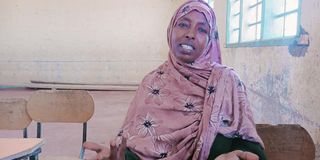Where are my periods? Woman’s 20-year wait

Abshiro Madina speaks to nation.africa during the interview in Salama Village, Tana River County, on September 3, 2023.
What you need to know:
- For nearly 20 years Abshiro Madina has hoped to see her menstrual cycle like other women in vain.
- When other women talked about their menstrual situations, she would join the conversation with the knowledge from school.
- She has tried to find a solution to her problem without success.
Abshiro Madina first heard about the menstrual cycle in a classroom as a young girl. She hoped that just like her older colleagues, she would one day experience this reproductive cycle that is every woman’s experience when they reach puberty.
The 32-year-old mother of seven has, however, had a rough ride in life, clogged with confusion about her biological clock that has not been ticking accordingly.
For nearly 20 years Ms Madina has hoped to see her menstrual cycle like other women in vain.
"I witnessed my colleagues getting their periods while I was in class six. By the time I was sitting for my KCPE exams, all my agemates were menstruating except for me, so I became worried," she narrates.
Days turned into weeks, weeks into months and years. When she joined secondary school, she confronted her teacher to enquire if she was normal, she was scared.
Patience
"I asked my teacher why at the age of 16 years, I was yet to get my menses. She told me that maybe my time hadn’t com and that I should give it time. By then, all girls I knew would walk with sanitary towels in their bags; I wanted the same," she narrates.
This did not happen and her patience grew weary by the day. She feared talking about it with other women lest they considered her abnormal and avoid her.
When other women talked about their menstrual situations, she would join the conversation with the knowledge from school.
"I would hear women complain about the high cost of sanitary towels and how girls would stay away from school when they are on their period.
“I wished I could just wake up and see that blood on my dress, I would walk in that dress with a lot of joy, unfortunately, "she says with a fallen countenance.
It has been a long wait for her, and there seems to be no hope for her.
Her situation has confused medical experts, especially during her antenatal visits, as they are forced to guess her cycle to schedule her for prenatal appointments.
"I never know when I’m pregnant, I just start feeling heavy, and when I walk to the hospital after tests, the first question they will ask is when I last saw my period.
Find solution
“They gasp when I tell them I have never seen anything like that, they think I don't even know what they are talking about so they clarify 'Ile damu ya mwezi ya wanawake'. It leaves me embarrassed," she says.
Ms Madina has tried to find a solution to her problem without success.
Walking from one herbalist to the next, drinking one herb after another, going from one traditional masseuse to another, all in vain.
She believes her condition is a result of a female genital mutilation (FGM) procedure gone wrong.
"Maybe they interfered with some nerves or something happened during that time that caused all this. I have a lot of questions in my mind. All I want, however, is to experience menstruation like other women," she says.
The Early Childhood Development Education (ECDE) teacher in Tana River County notes that she sometimes experiences menstruation symptoms like red face, fatigue, tender breasts, bloating, mood swings, and headache, but after a few days, it's gone with no results.
Now a teacher to more than 100 children, all she can do is teach about menstrual hygiene and a cycle she has never experienced. She hopes that she can get help and get the experience it one day.

Kenneth Miriti, a reproductive, maternal, child, and adolescent health coordinator based at Kilifi General Hospital during the interview with nation.africa in Kilifi County.
Kenneth Miriti, a reproductive, maternal, child, and adolescent health coordinator based at Kilifi General Hospital, the condition is a gynaecologic emergency that requires proper evaluation.
" FGM is not an internal issue that it can cause amenorrhea unless the procedure was very severe and affected the entire vagina, which could be very serious," he says.
He notes that such an incident may occur in type three of FGM where the vaginal introitus is closed, such he says, will require the victim to undergo vaginoplasty and mega urethra plication for reconstruction.





